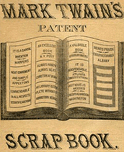Quoting Malory "and all"A great deal of the story MT wrote as the eyewitness reporting of a Connecticut Yankee at King Arthur's court can be traced back to Sir Thomas Malory's account of Camelot. The links listed here are to the several places in MT's text where he quotes at length from Malory's text. Given his larger intention to explode the idealization of the Middle Ages, not to mention the way MT often treated other dead authors like Scott and Cooper in print, he is surprisingly gentle in his treatment of the interpolated passages, but the comments he makes in his own voice or puts into Hank's mouth are a kind of literary criticism. Before quoting from BOOK VI in the prefatory "Word of Explanation," for example, MT refers to "old Sir Thomas Malory's enchanting book," and speaks of "dreaming" over its "rich feast of prodigies and adventures." The second interpolated passage is introduced more harshly. Before "Merlin" tells the following tale, the page whom Hank has just met (later known as Clarence) protests against its repetition -- and for him and all the other company around the Round Table, "dreaming" becomes literal when Malory's prose puts them all to sleep. At the same time, after quoting it, Hank says "this quaint lie was most simply and beautifully told," though he admits that he "had heard it only once." Chapter 3, from Morte Darthur, BOOK I, CHAPTER XXIII That a text like Malory's "lies" -- is essentially false to reality -- is probably MT's most serious indictment of it, but before the next interpolated passage Hank re-emphasizes the point that Malory's art is too flat. The following report of a tournament he calls "quaint and sweet and simple," but cites as "its more important lacks" the absence of "whoop and crash and lurid description." Chapter 9, from Morte Darthur, BOOK VII, CHAPTER XXVIII The next big chunk of Malory is put into Sandy's mouth, as she supposedly tells the story of the knights whom Hank has overmatched with the smoke from his pipe. Here the act of criticism is constituted as a series of interruptions, in which Hank's unmistakably vernacular voice comments explicitly and implicitly on Malory's style and diction, and on the way they render reality. He also keeps falling asleep, although comparing what the novel includes with the original text shows that Hank doesn't sleep through as much as he suggests. Chapter 15, from Morte Darthur, BOOK IV, CHAPTERS XVI-XIX, XXIV-XXV When Sandy resumes the tale she is telling from Malory after the interlude in Morgan le Fay's castle -- an long interruption which in itself constitutes a kind of deconstructive re-vision of the Morte Darthur -- Hank promises not to interrupt any more -- and doesn't. The only sign of criticism here is the note that "M.T." himself supplies to Sandy's tale: "The story is borrowed, language and all, from the Morte d'Arthur." Presumably MT expects his readers to infer a lot from "and all." Chapter 19, from Morte Darthur, BOOK IV, CHAPTERS XVI-XIX, XXIV-XXV The last example of the novel's appropriation of Malory is perhaps the most ambiguously situated in MT's text. Hank hears it from Clarence's voice, as both an account of the end of Arthur and an example of the "something fresh" that Clarence has started since Hank left the kingdom -- "war correspondence." "That's good!" Hank says before hearing the example; after Clarence reads it, Hank calls it "a good piece of war correspondence." It is a very beautiful passage. By quoting it, defining it against what Hank has achieved, and having Hank himself admire it, MT seems to be going further than his premises would have enabled us to predict to recuperate Malory. Chapter 42, from Morte Darthur, BOOK XXI, CHAPTER IV |

